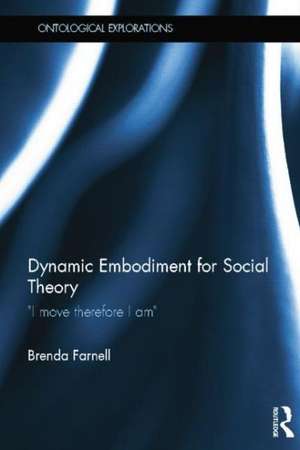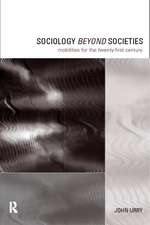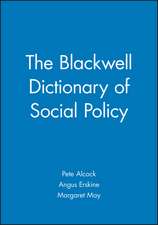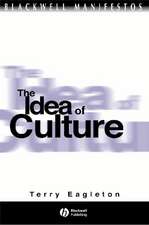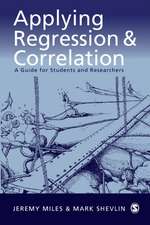Dynamic Embodiment for Social Theory: I move therefore I am: Ontological Explorations (Routledge Critical Realism)
Autor Brenda Farnellen Limba Engleză Paperback – 19 mai 2014
Using the work of Rom Harré, Roy Bhaskar, Charles Varela and Drid Williams this book applies causal powers theory to a revised ontology of personhood, and discusses why the adequate location of human agency is crucial for the social sciences. The breakthrough lies in fact that new realism affords us an account of embodied human agency as a generative causal power that is grounded in our corporeal materiality, thereby connecting natural/physical and cultural worlds.
Dynamic Embodiment for Social Theory is compelling reading for students and academics of the social sciences, especially anthropologists and sociologists of ‘the body’, and those interested in new developments in critical realism.
| Toate formatele și edițiile | Preț | Express |
|---|---|---|
| Paperback (1) | 480.83 lei 6-8 săpt. | |
| Taylor & Francis – 19 mai 2014 | 480.83 lei 6-8 săpt. | |
| Hardback (1) | 820.56 lei 6-8 săpt. | |
| Taylor & Francis – 23 feb 2012 | 820.56 lei 6-8 săpt. |
Din seria Ontological Explorations (Routledge Critical Realism)
- 8%
 Preț: 425.29 lei
Preț: 425.29 lei -
 Preț: 340.38 lei
Preț: 340.38 lei -
 Preț: 326.49 lei
Preț: 326.49 lei -
 Preț: 295.64 lei
Preț: 295.64 lei -
 Preț: 379.07 lei
Preț: 379.07 lei - 28%
 Preț: 821.10 lei
Preț: 821.10 lei - 28%
 Preț: 817.51 lei
Preț: 817.51 lei -
 Preț: 488.33 lei
Preț: 488.33 lei -
 Preț: 461.86 lei
Preț: 461.86 lei - 18%
 Preț: 1058.43 lei
Preț: 1058.43 lei - 30%
 Preț: 937.61 lei
Preț: 937.61 lei -
 Preț: 438.14 lei
Preț: 438.14 lei - 17%
 Preț: 270.20 lei
Preț: 270.20 lei -
 Preț: 413.33 lei
Preț: 413.33 lei - 18%
 Preț: 1117.07 lei
Preț: 1117.07 lei -
 Preț: 464.54 lei
Preț: 464.54 lei -
 Preț: 365.91 lei
Preț: 365.91 lei -
 Preț: 145.32 lei
Preț: 145.32 lei - 18%
 Preț: 1058.69 lei
Preț: 1058.69 lei - 43%
 Preț: 213.77 lei
Preț: 213.77 lei - 43%
 Preț: 189.44 lei
Preț: 189.44 lei - 23%
 Preț: 339.31 lei
Preț: 339.31 lei -
 Preț: 446.53 lei
Preț: 446.53 lei - 15%
 Preț: 425.26 lei
Preț: 425.26 lei -
 Preț: 413.76 lei
Preț: 413.76 lei - 18%
 Preț: 1225.29 lei
Preț: 1225.29 lei - 29%
 Preț: 273.65 lei
Preț: 273.65 lei - 18%
 Preț: 1054.89 lei
Preț: 1054.89 lei - 28%
 Preț: 819.32 lei
Preț: 819.32 lei -
 Preț: 480.24 lei
Preț: 480.24 lei - 18%
 Preț: 1108.73 lei
Preț: 1108.73 lei - 28%
 Preț: 823.08 lei
Preț: 823.08 lei - 30%
 Preț: 854.14 lei
Preț: 854.14 lei - 31%
 Preț: 331.35 lei
Preț: 331.35 lei
Preț: 480.83 lei
Nou
Puncte Express: 721
Preț estimativ în valută:
92.02€ • 99.92$ • 77.29£
92.02€ • 99.92$ • 77.29£
Carte tipărită la comandă
Livrare economică 22 aprilie-06 mai
Preluare comenzi: 021 569.72.76
Specificații
ISBN-13: 9781138798465
ISBN-10: 1138798460
Pagini: 176
Dimensiuni: 156 x 234 x 11 mm
Greutate: 0.25 kg
Ediția:1
Editura: Taylor & Francis
Colecția Routledge
Seria Ontological Explorations (Routledge Critical Realism)
Locul publicării:Oxford, United Kingdom
ISBN-10: 1138798460
Pagini: 176
Dimensiuni: 156 x 234 x 11 mm
Greutate: 0.25 kg
Ediția:1
Editura: Taylor & Francis
Colecția Routledge
Seria Ontological Explorations (Routledge Critical Realism)
Locul publicării:Oxford, United Kingdom
Public țintă
PostgraduateCuprins
Chapter 1 The Primacy of Movement
Chapter 2 The Body in Social Theory
Chapter 3 A New Ontology of Personhood
Chapter 4 Movement Literacy
Chapter 5 Bourdieu’s Habitus – A Sociological Mislocation of Agency
Chapter 6 Lakoff’s and Johnson’s Metaphors – A Psychological Mislocation of Agency
Chapter 7 Verbal and Nonverbal – A Linguistic Mislocation of Agency
Chapter 8 The Ab(sense) of Kinesthesia in Western Thought
Chapter 9 Implications of Dynamic Embodiment for Social Theory
Chapter 2 The Body in Social Theory
Chapter 3 A New Ontology of Personhood
Chapter 4 Movement Literacy
Chapter 5 Bourdieu’s Habitus – A Sociological Mislocation of Agency
Chapter 6 Lakoff’s and Johnson’s Metaphors – A Psychological Mislocation of Agency
Chapter 7 Verbal and Nonverbal – A Linguistic Mislocation of Agency
Chapter 8 The Ab(sense) of Kinesthesia in Western Thought
Chapter 9 Implications of Dynamic Embodiment for Social Theory
Descriere
This book presents a series of ontological investigations into an adequate theory of embodiment for the social sciences. Informed by a new realist philosophy of causal powers, it seeks to articulate a concept of dynamic embodiment, one that positions human body movement, and not just ‘the body’ at the heart of theories of social action.
Using the work of Rom Harré, Roy Bhaskar, Charles Varela and Drid Williams this book applies causal powers theory to a revised ontology of personhood, and discusses why the adequate location of human agency is crucial for the social sciences. The breakthrough lies in fact that new realism affords us an account of embodied human agency as a generative causal power that is grounded in our corporeal materiality, thereby connecting natural/physical and cultural worlds. Dynamic Embodiment for Social Theory is compelling reading for students and academics of the social sciences, especially anthropologists and sociologists of ‘the body’, and those interested in new developments in critical realism.
Using the work of Rom Harré, Roy Bhaskar, Charles Varela and Drid Williams this book applies causal powers theory to a revised ontology of personhood, and discusses why the adequate location of human agency is crucial for the social sciences. The breakthrough lies in fact that new realism affords us an account of embodied human agency as a generative causal power that is grounded in our corporeal materiality, thereby connecting natural/physical and cultural worlds. Dynamic Embodiment for Social Theory is compelling reading for students and academics of the social sciences, especially anthropologists and sociologists of ‘the body’, and those interested in new developments in critical realism.
